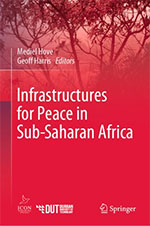SAB
Vol 4 |
Mediel Hove, Geoff Harris (Eds.): Infrastructures for Peace in Sub-Saharan Africa (Cham: Springer Nature Switzerland, 2019).
ISBN (Hardcover): 978-3-030-14693-1
ISBN (Softcover): 978-3-030-14696-2
ISBN (MyCopy): 978-3-030-38570-5
Order this book on Springer Website
|

|
Introduction
Cultures of violence are characteristic of many countries in sub-Saharan Africa and attempts to move towards cultures of peace have often proved difficult and ineffectual. And yet, the wide variations in levels of violence within and between countries show that it is not inevitable; rather, it is the result of choices made at individual, community and societal levels. This book examines the potential of peace infrastructures as vehicles to strengthen and spread progress towards cultures of peace.
Peace infrastructures vary hugely in sophistication and level. The examples examined in this book range from tiny structures which help resolve conflicts between individuals and within community organisations, peace committees which serve local communities, peace education and peace club programmes in schools, mediation mechanisms to prevent election violence and to ministries of peace to coordinate government and non-government efforts in peacemaking and peacebuilding. The overall finding is that the development of peace infrastructures at all levels has great potential to build cultures of peace.
- It is the only book available which documents the experience and potential of nonviolence in post-independence sub-Saharan Africa.
- It makes a persuasive case for the development of various peace infrastructures in order to make peace sustainable.
- It explains how strategic planning can be utilised, both to bring about change and to institutionalise it.
Keywords: Nonviolence, Infrastructures for peace, Peacebuilding in Sub-Saharan Africa, Violence prevention, Peace Studies
Editors affiliations
Mediel Hove, War, Peace and Strategic Studies, University of Zimbabwe, Harare, Zimbabwe
Geoff Harris, International Centre of Nonviolence (ICON)Durban University of Technology, Durban, South Africa |